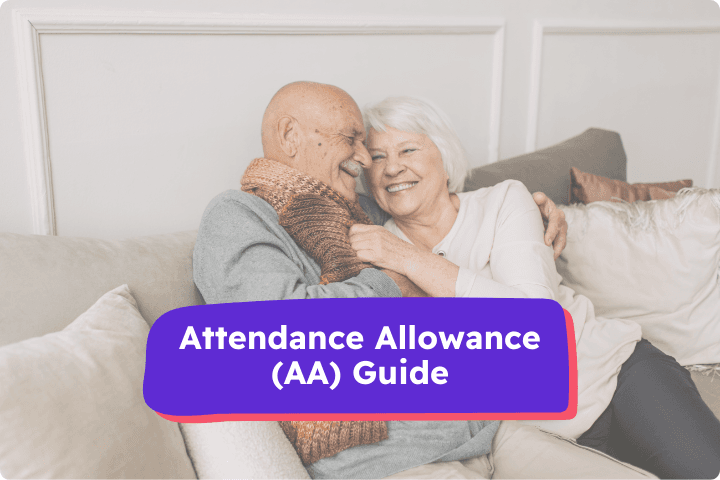All Articles
13 min read
Understanding Attendance Allowance – Disability Benefit for Disabled People Over 65
Written by
Georgina, Founder of Purpl
Published on
January 21, 2025

As we all age, we may encounter disabilities or health conditions that significantly impact our daily lives. In the UK, Attendance Allowance (AA) is a benefit designed to help older people with the extra costs associated with these challenges. However, many people are unaware of how Attendance Allowance works or how to apply for Attendance Allowance, our Purpl Life guide provides a detailed explanation of Attendance Allowance, its eligibility criteria, and a step-by-step guide to applying for this benefit. In Scotland, the equivalent of AA is Pension Age Disability Benefit Payment, this is currently available in certain areas of Scotland, but Pension Age Disability Payment will be available to every area in Scotland from 22 April 2025.
Information in this guide is correct as of January 2025.
- What is Attendance Allowance?
- Who is Eligible for Attendance Allowance?
- Step-by-Step Guide to Applying for Attendance Allowance
- How to Apply for Attendance Allowance
- How to Complete the Attendance Allowance Application Form
- What Happens After Claiming Attendance Allowance
- How to Appeal if you were Denied Attendance Allowance
- How to Apply Under the Special Rule
- Tips for a Successful Attendance Allowance Application
- How Much Attendance Allowance Benefit will I Receive?
- Common Mistakes to Avoid When Applying for a Disability Benefit
- How Attendance Allowance can Impact Other Benefits
- Getting Support for your Attendance Allowance Claim
- When to Report a Change in Circumstances
- How to Report a Change in Circumstances
- What Other Help is Available?
- Frequently Asked Questions
- Conclusion
What is Attendance Allowance?
Attendance Allowance (AA) is a non-means-tested benefit provided by the UK government for people aged 65 and over who have a disability or health condition that affects their daily lives. Unlike some other benefits, Attendance Allowance is not income-related, meaning you can receive it regardless of your income or savings.
The purpose of Attendance Allowance is to help with the extra costs of having a disability or long-term health condition. It can be used in any way that supports your daily living, such as paying for help around the home, transport costs, or mobility aids.
Attendance Allowance is tax-free and not tied to other benefits. However, receiving AA may increase the amount you’re entitled to from other benefits, such as Pension Credit or Housing Benefit.
Who is Eligible for Attendance Allowance?
To qualify for Attendance Allowance, you must meet the following criteria:
1. Age Requirement
You must be of State Pension age to claim Attendance Allowance, if you are below State Pension age, you may be eligible for Personal Independence Payment (PIP) instead.
2. Disability or Health Condition
You must have a physical or mental disability or health condition that requires help with personal care or supervision to ensure your safety. This includes conditions such as arthritis, dementia, Parkinson’s disease, or sensory impairments.
3. Duration of Need
You must have needed help for at least six months before making a claim. However, if you are terminally ill, you can apply under Special Rules, and the six-month waiting period does not apply. To qualify under the Special Rules you will need your clinician to complete a SR1 form. Please read the Special Rules section for further details.
4. Daily Living Needs
Attendance Allowance focuses on the care and supervision you require rather than mobility needs. It covers assistance with activities such as:
- Washing and dressing
- Eating and drinking
- Using the toilet
- Taking medication
- Preventing risks to your safety, such as falls or confusion
5. Residence and Presence
You must be living in the UK, Ireland, or a country within the European Economic Area (EEA) or Switzerland to qualify. Additionally, you must have been in one of these countries for at least two of the last three years.
Scottish Eligibility for Pension Age Disability Benefit
In Scotland, to qualify for Pension Age Disability Payment, you must meet the same requirements as above but be living in one of the following areas, Aberdeen City, Argyll and Bute, Highland, Orkney Islands or Shetland Islands. For more information, see the following section.

Step-by-Step Guide to Applying for Attendance Allowance
Applying for Attendance Allowance involves several steps, and it is essential that you provide accurate and thorough information to improve your chances of a successful claim.
We will go through each step in detail to help you through the process.
If you live in Northern Ireland you will need to apply through the NI Direct website
If you live in one of the following areas within Scotland, you will need to apply for a Pension Age Disability Benefit Payment. Pension Age Disability Payment will be available to every area in Scotland from 22 April 2025. For any other regions in Scotland please apply for Attendance Allowance as detailed in the next section.
- Aberdeen City
- Argyll and Bute
- Highland
- Orkney Islands
- Shetland Islands
Please note that everyone in Scotland will automatically be moved to the Pension Age Disability Benefit Payment from Spring 2025. If you are reading this after March 2025 then please check to see if your region has now moved to the new Scottish system as you may need to apply directly via their website.
How to Apply for Attendance Allowance
The first step is to get the Attendance Allowance claim form:
- Apply online via the government website – this a new service and does not work on a mobile phone or a tablet
- Download the form online from the government website
- Call the Attendance Allowance Helpline on 0800 731 0122 and ask them to send you a paper form
If you have a terminal illness please read more about how to apply under Special Rules.
How to Complete the Attendance Allowance Application Form
The Attendance Allowance application form is detailed and requires information about your health, care needs, and the impact of your condition on your daily life.
You will need to provide the following information on the Attendance Allowance application form:
Personal Details: you will need to provide your full name, address, date of birth, and National Insurance number.
Describe Your Health Condition: you will need to explain your diagnosis or health condition and how it affects you. Make sure you use clear, detailed descriptions, and include any medical terms if applicable.
Detail Your Care Needs: you will need to provide information on the specific tasks you need help with and how frequently you require assistance. For example:
- describe how long it takes you to get dressed
- whether you need help with meals
- if someone needs to supervise you for safety
Supporting Evidence: don’t forget to include all your medical evidence including:
- GP letters, hospital reports, or care assessments
- details of any prescribed medications or treatments
Remember to be honest and specific, it is natural for many disabled people to underestimate their needs. Always think about and then describe your worst days and/or most challenging aspects of your condition.
We recommend that you use examples to illustrate the difficulties you face, such as struggling to get out of bed or needing reminders to take medication.
Ask your partner, a family member or close friend to help you give examples, my husband will always remember more details and examples than me, as I am not good at admitting when I need help and am always fighting to be independent.
Georgina’s Disability Money Saving Tips
Submit the Form: once you’ve completed the form, make sure you:
- double-check all sections to ensure accuracy
- attach your additional evidence or documents
- If you have a paper form you will need to send to post it back to the address provided in the application pack, we recommend using recorded delivery
You might want to take copies of everything you send as this will help to remind you what you put on the application form in case you need an assessment and need to refresh your memory. It’s also helpful in case anything goes missing during the process.
Georgina’s Disability Money Saving Tips
If you need assistance completing the form you can contact Charities like Age UK or Citizens Advice who can help you through the process.

What Happens After Claiming Attendance Allowance
The Department for Work and Pensions (DWP) will review your application and may contact you or your doctor for further information. You should receive a text or a letter within three weeks letting you know when to expect a decision. Decisions typically take 6-8 weeks, but this can vary.
You will receive a decision letter from the DWP. If your application is successful, the letter will outline your award rate and payment details.
How to Appeal if you were Denied Attendance Allowance
If your claim for Attendance Allowance was denied, you can:
Request a Mandatory Reconsideration
Write to the DWP within one month, explaining why you disagree with the decision. Include additional evidence if possible.
For further help with requesting a mandatory reconsideration please visit the government website.
Appeal to an Independent Tribunal
If your reconsideration is unsuccessful, you can appeal to a tribunal for a review of your case. Find out more about how to appeal a benefit decision through a tribunal.
How to Apply Under the Special Rule
If you are terminally ill and are nearing the end of life, you will qualify for Attendance Allowance under Special Rules. This is to help you get access to benefits faster and easier, as well as potentially getting higher payments. It also means you will not be required to have a medical assessment.
Your clinician will need to complete an SR1 form (previously a DS1500 form) providing medical evidence to support their belief that you have a progressive disease, and as a consequence of that disease, you are likely to die within 12 months.
It is recommended that your clinician completes and submits the form promptly so you can get the benefits you need as quickly as possible.
A clinician can be:
- your consultant
- your GP
- your hospice doctor
- a senior specialist nurse (for example; a clinical nurse specialist)
Please note that there is no negative consequence for either the clinician or the person if they outlive the 12 month period.
Tips for a Successful Attendance Allowance Application
- Be Thorough: Provide as much detail as possible about your condition and care needs.
- Seek Assistance: Charities like Age UK or Citizens Advice can help you complete the application form, see further support for different countries [link to section further down]
- Include Evidence: Attach medical records, care plans, or supporting letters from healthcare professionals.
- Focus on Care Needs: Emphasise the help and supervision you require, even if you don’t currently receive support from others.
- Don’t Delay: Submit your application promptly to avoid missing out on payments.
How Much Attendance Allowance Benefit will I Receive?
There are two different rates for Attendance Allowance, this will be dependent on what level of care you require.
- Lower Rate ( 68.10 per week as of 2023)
- For individuals who need frequent help or supervision during the day OR night.
- Higher Rate (£101.75 per week as of 2023)
- For individuals who need help or supervision during both day AND night, or if they are terminally ill.
Attendance Allowance is paid every four weeks directly into your bank or building society account and the date it starts will depend on how you applied.
You must always report any change in circumstances as this may result in a rate change.
Georgina’s Disability Money Saving Tips
Please note that mobility needs are not covered with Attendance Allowance, there are petitions to have it added but currently you will not get help with mobility needs and therefore will not be eligible to apply for motability.
Common Mistakes to Avoid When Applying for a Disability Benefit
- Providing Insufficient Information: Failing to describe the impact of your condition in detail can lead to a rejected claim.
- Overlooking Evidence: Ensure you include all relevant medical and supporting documents.
- Underestimating Your Needs: Be honest about your struggles, even if you find it uncomfortable to discuss them.
- Missing Deadlines: Respond to requests for information or decisions promptly to avoid delays.
How Attendance Allowance can Impact Other Benefits
Receiving Attendance Allowance may increase your entitlement to other benefits, such as:
- Pension Credit: You may qualify for additional amounts known as Severe Disability Premiums
- Housing Benefit: Attendance Allowance can increase the amount you receive to help with housing costs
Attendance Allowance is not means-tested and does not affect your State Pension. It is also not counted as taxable income.

Getting Support for your Attendance Allowance Claim
It can be daunting when applying for disability benefits like Attendance Allowance so please don’t be afraid to ask for help as there are plenty of organisations that come help you through the process.
Getting Help in England
For disabled people living in England, you can get help from charities like Age UK or Citizens Advice. Age UK say “Growing older doesn’t come with a manual”, so if you need information, advice or support, you can call their free national information line on 0800 678 1602.” It’s open 365 days a year from 8am to 7pm and they can also provide information and advice on money, wellbeing, health and lifestyle. They have a range of impartial and informative factsheets and advice guides that may be helpful too.
Citizens Advice offer guidance to people in England and can offer you the help you need to complete your Attendance Allowance forms.
You can also contact your GP or local council for advice on other related services or benefits that may be available in your area.
Getting Help in Wales
If you live in Wales and need assistance with your Attendance Allowance application, organisations such as Citizens Advice Cymru and Age Cymru can provide valuable support. These organisations offer guidance tailored to residents in Wales, ensuring that you can access the help you need to complete your claim effectively.
You can also contact your local council for advice on other related services or benefits that may be available in your area.
Getting Help in Scotland
Residents in Scotland can access specific local support services for assistance with their applications. It’s worth exploring what additional help might be available in your local area by contacting your local council or visiting the Scottish Government’s website for further information.
Organisations such as Age Scotland and Citizens Advice Scotland offer free advice and guidance tailored to Scottish claimants.
Getting Help in Northern Ireland
Disabled people claiming Attendance Allowance in Northern Ireland can access local support through organisations such as Age NI and Advice NI, which offer free advice and assistance with completing the application form.
Additionally, the Northern Ireland Executive may provide information on other services or benefits that could complement Attendance Allowance. Residents can also contact their local Health and Social Care Trust for further guidance on support options available in their area.
When to Report a Change in Circumstances
If your circumstances change, the amount you get from Attendance Allowance may go up or down and it is your responsibility to report that change. It is very important that you do this as you could lose your benefits, be taken to court or have to pay a penalty if you give wrong information or do not report a change in your circumstances.
You must contact the Attendance Allowance helpline immediately if:
- your condition changes
- the level of help you need changes
- you go into hospital or a care home – provide the address, the dates you’ve been there for, and how your stay is paid for
- you plan to leave the country for more than 4 weeks, even if on holiday or visiting
- you go into prison
- you change your name, address or bank details
- you want to stop receiving your benefit
- your doctor’s details change
- your immigration status changes, if you’re not a British citizen
- you are told by a medical professional that you have less than 12 months to live
How to Report a Change in Circumstances
To report a change in circumstance, you need to call the Attendance Allowance helpline, it is open Monday to Friday, 8am to 6pm.
Have your information to hand including any reference numbers.
Telephone: 0800 731 0122
Textphone: 0800 731 0317
Relay UK (if you cannot hear or speak on the phone): 18001 then 0800 731 0122
British Sign Language (BSL) video relay service if you’re on a computer – find out how to use the service on mobile or tablet.

What Other Help is Available?
Attendance Allowance is a tax-free benefit. You’ll be exempt from the Benefit Cap so you won’t have money taken away from any other benefits. Receiving Attendance Allowance could mean an increase in means-tested benefits or tax credits you receive, or you may discover that you qualify for them for the first time and so it is important to contact the offices that pay you those benefits for more information.
A great way to find out what benefits you’re entitled to and how much you could be getting by using our Purpl benefits calculator powered by Turn2us (Turn2us is a national charity offering information and practical support to people facing financial insecurity.)
Council Tax
Claiming Attendance Allowance might also mean you’re entitled to extra help – for example, you might qualify for a council tax reduction (this depends on your personal circumstances) by getting ‘Council Tax Reduction’ assistance if you get Attendance Allowance.
Even if you were already getting a reduction in your council tax, you might be able to get more now that you’re getting Attendance Allowance. Your local council can check what Council Tax Reduction you should be getting. You can get details on applying to your local council for Council Tax Reduction.
Other Benefits
It might be worth applying for benefits like Pension Credit – or Universal Credit if you live with a partner under State Pension age. If you get Pension Credit or Universal Credit, you can get extra help with the cost of living – for example Winter Fuel Payments. You can:
Georgina Disability Money Saving Tip – It might be worth applying even if you’ve been refused in the past because you earned too much. Getting Attendance Allowance means you’re allowed to earn more money than before without your benefits being affected.
Carers Allowance
If someone looks after you they might be able to claim Carer’s Allowance if you get Attendance Allowance. Read more about Carer’s Allowance on GOV.UK.
Your carer might get Carer’s Allowance if:
- you get any rate of Attendance Allowance
- they spend at least 35 hours a week caring for you
- they earn less than £151 a week (after taxes)
Blue Badge scheme
The Blue Badge scheme helps you park closer to your destination if you have difficulty walking. Getting Attendance Allowance might support your application for a Blue Badge. Contact your local council or trust for further information.
Disabled Person’s Railcard
If you claim, Attendance Allowance, you can buy a Disabled Person’s Railcard to cut train fares for you and a friend.
Help with the Cost of Public Transport
If you live in England, Wales or Northern Ireland and are disabled, you may qualify for free local bus travel. But this isn’t linked to whether not you receive Attendance Allowance, you need to contact your local council to find out more.
In Scotland, if you receive Attendance Allowance you’ll be entitled to free bus travel. Contact Transport Scotland on 0141 272 7100. You will also be entitled to a Companion Card, allowing someone to travel with you for free.
In Northern Ireland, you’ll be entitled to a Senior Citizen SmartPass if you’re 65 or over. Contact Translink on 0845 600 0049 for more information.
Frequently Asked Questions
What are Special Rules?
If you are terminally ill and are nearing the end of life, you will qualify for Attendance Allowance under Special Rules. This is to help you get access to benefits faster and easier, as well as potentially getting higher payments. It also means you will not be required to have a medical assessment.
Your clinician will need to complete an SR1 form providing medical evidence to support their belief that you have a progressive disease, and as a consequence of that disease, you are likely to die within 12 months.
What can I use Attendance Allowance money for?
What can I use the money for?
You can spend the money on whatever you want, such as equipment or support to help you live independently.
How much money can you have in the bank on Attendance Allowance?
Attendance Allowance isn’t means tested so it doesn’t matter what other money you get. It doesn’t matter how much you have in savings either – there’s no limit.
Conclusion
Attendance Allowance is a vital benefit that provides financial support to older adults with disabilities or health conditions who live in the UK. By understanding the eligibility criteria and following the application process carefully, you can maximise your chances of receiving the benefit. Remember to seek help from support organisations if you need assistance completing your claim.If you’re struggling with a disability or long-term health condition, don’t hesitate to apply for Attendance Allowance or Pension Age Disability Benefit Payment. It may feel a little overwhelming but there is support available and the extra money could make a significant difference in your daily life and well-being.
About the Author

Georgina is the founder of Purpl, a platform dedicated to helping disabled people save money through exclusive discounts. Living with Multiple Sclerosis (MS) and ADHD, she understands firsthand the financial challenges of living with a disability. Her mission is to work with brands to secure discounts that ease the cost of essential products, services, and everyday expenses for the disabled community.
As an ambulatory wheelchair user, Georgina knows how it feels to lose independence due to a disability. She is passionate about holistic therapies and diet to manage inflammation and stay as healthy as possible. Her goal is to make Purpl an essential resource for disabled people, offering practical support, advice, and financial relief.
Beyond Purpl, Georgina has a long-term vision to launch a foundation providing grants for disabled people who need extra financial support.
She lives in Hampshire, UK, with her husband, son, three stepsons, two cats, and a friendly Labrador. A keen reader, Lego enthusiast, and family-focused person, Georgina is committed to building a supportive, inclusive community for those navigating life with a disability.
Follow @Purpldiscounts for the latest disability discounts, financial advice, and accessibility resources.
Related Disability Benefits Articles
Blue Badge Guide – Parking for Disabled People in the UK
How to Apply for a Charitable Grant for Disabled People
How to Apply for a Disabled Bus Pass and Enjoy the Benefits of Accessible Travel
Understanding Car Tax Discounts for Disabled People in the UK
